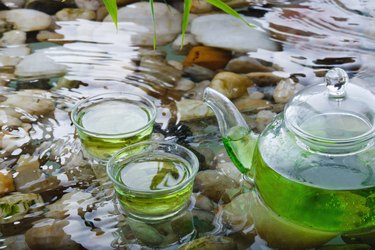
Tea is a widely enjoyed beverage in many different cultures. This versatile drink can be served in a variety of flavors, both hot and cold. Several varieties of tea, particularly green tea, may impart health benefits for some conditions. These teas may impair the aggregation of platelets in the blood that can lead to blood clots. While this effect may be desirable for some individuals, if you're currently receiving treatment to thin your blood, see your doctor before using any herbal or dietary supplement.
Anticoagulants (Blood Thinners)
Video of the Day
The term blood thinner or anticoagulant generally refers to prescription medications used to decrease your risk of a heart attack, stroke or embolism caused when blood coagulates into a blockage. Over-the-counter medications like aspirin also have blood-thinning properties. In addition, foods that are high in vitamin K, such as green leafy vegetables and cauliflower, have natural blood-thinning properties, according to the Texas Heart Institute. Other foods may also thin your blood, so it's important to recognize substances that can cause an unwanted interaction with medications you're taking.
Video of the Day
Benefits of Tea
Consuming tea appears to decrease your risk of developing heart disease, according to Drugs.com. Green tea, which is made from the same plant as black tea, has been used for centuries in Asian cultures and more recently has been found to have several potential health benefits. Memorial Sloan-Kettering Cancer Center explains that drinking green tea regularly may decrease hypertension, death from heart disease and may also improve your body's ability to use glucose. Additionally, substances found naturally in green tea can impair the effectiveness of some medications, including codeine and medications used to treat cancer.
Thinning the Blood
Green tea appears to have a blood-thinning effect that can be beneficial for some people and detrimental to those who are already taking a blood thinner. A 1999 article published in "The Annals of Pharmacotherapy" described an incident in which a patient's blood became dangerously thin due to an interaction between green tea and warfarin, a prescription blood thinner. The article explains that green tea contains vitamin K, which can thin the blood. The patient in question was consuming large quantities of green tea daily, but the amount that would cause an unwanted effect can vary with the individual.
Considerations
Tea, especially the green variety, can generally be enjoyed by most people without problems. Memorial Sloan-Kettering Cancer Center recommends that if you are pregnant, breastfeeding or have an ulcer that you avoid drinking green tea. In addition, if you are currently taking an anticoagulant medication, the University of Maryland Medical Center states that green tea should be avoided. The anticoagulant effect appears to be limited to green tea, according to the Cleveland Clinic, and black tea can be consumed without concern for additional blood thinning.
- Memorial Sloan-Kettering Cancer Center: Green Tea
- "The Annals of Pharmacotherapy"; Probable Antagonism of Warfarin by Green Tea; J. R. Taylor, et al.; 1999
- University of Maryland Medical Center: Green Tea
- Texas Heart Institute: Blood Thinners
- Cleveland Clinic: Understanding Coumadin
- Drugs.com: Green Tea